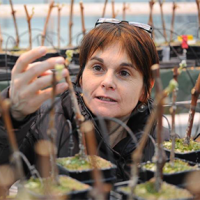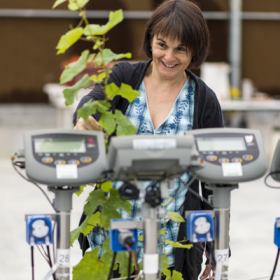
Climate change and risks Reading time 3 min
Nathalie Ollat: tomorrow’s inventive vines
Published on 09 December 2016
Grape vine expertise from a growing body of research
Nathalie Ollat ‘naturally’ joined INRA’s viticulture research centre in Bordeaux after obtaining a degree in agronomic engineering, specialised in plant physiology, in 1988. “I come from a farming family; I had a keen interest in how plants function and was tuned into the world of agriculture. INRA offered attractive opportunities in applied research. Starting out by working on grape varieties inspired me and led me to focus my work entirely on this subject.” She completed her doctoral thesis at the Plant Physiology unit in Bordeaux on the growth phases of grape berries: “I described the processes which occur from fruit set to maturity, showing that changes at the onset of maturity were sudden and that water intake pathways of plants changed at this stage.”
Getting to the root of great wine
In the late 1990s, Nathalie Ollat focused her research on grape vine rootstock. For decades, most grape vines in France and elsewhere had been grafted with American grape varieties, which were resistant to the plant’s worst nemesis: the Phylloxera aphid. Different rootstocks existed which were suitable for different types of soils and crops, and new varieties were developed on a regular basis. “At that point, INRA Bordeaux became the hub for rootstock research: the context made it possible to combine physiology and genetic improvements in plants,” remembers Nathalie Ollat. “I created a programme aimed at understanding the role played by rootstock in the functioning – and particularly the growth – of plants, which I thought could be useful scientific knowledge for grape-growing professionals.”
Nathalie Ollat and her team carried out several experiments in greenhouses and vineyards to measure the impact of rootstocks on vines on the plant’s nutrition, its water intake, leaf growth and yields. “In terms of the last two factors, we were able to show very clear effects – in some cases tenfold increases!” “
Vines and wines and the challenge of climate change
The constantly changing needs of wine growers
Over time, the issues facing wine growers have changed: “In the early 2000s, demand centred on rootstocks which could increase yield and vigour in vines. Now, growers need vines which can better adapt to drought and are equipped with a barrier effect against viruses transmitted by nematodes.”
Nathalie recently broadened her field of study with a research programme on the impact of climate change on grape growing1. With temperatures rising in France, the growing cycle of grape vine is becoming shorter, plants reach maturity sooner, grapes are changing in composition, and plants can require more water. The researchers’ initial findings show that considering local climate variations and choosing the right rootstock and grape variety will be among the adaptation strategies possible.
To address all these questions, Nathalie Ollat worked with scientists from other fields: physiologists, agronomists, oenologists, pathologists, climatologists and economists. “Creating multidisciplinary teams and working with scientists from diverse fields was very stimulating! I encouraged the sharing of ideas across disciplines because I feel that studying a problem from different angles is important in our efforts to find solutions for the viticulture industry.” The future of grape vines and wine, a rich heritage, is safe in Nathalie Ollat’s hands!
1 Nathalie Ollat and Jean-Marc Touzard, Research Director at the Joint Research Unit on Innovation and Development in Agriculture and Food (INRA-CIRAD-Montpellier Supagro) coordinated the LACCAVE programme on long-term impacts and adaptations to Climate Change in viticulture and oenology in France.
Mini-CV

• Degree in Agricultural Engineering, specialisation in plant physiology, and Master’s degree in Agricultural Sciences (1987)
• Master’s degree in oenology and viticulture (1989)
• Doctorate in Agronomic Sciences (1996)
• Accreditation to supervise research (2014)
• 48 publications in peer-reviewed journals
